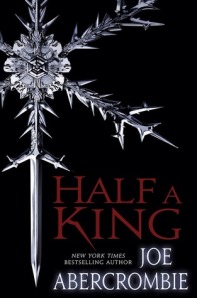It left a bad taste in my mouth, like toothpaste and orange juice, when I learned that Joe Abercrombie was writing a series for young adults. Lord Grimdark is pandering to the kiddies? Gross. I needn’t have worried. From the moment I got my clammy, fanboy hands on Abercrombie’s latest book, I was hooked. Abercrombie and YA is like peanut butter and chocolate. Come, fantasy fans and Abercrombie aficionados, and gorge upon the bounty that is Half a King (Del Rey, July 3 2014).
The story opens when Prince Yarvi of Gettland, intended for the ministry (in this case, a brotherhood of advisers and diplomats who work toward peace) learns that his father, King Uthrik, is dead, killed by the Gettlanders’ neighbors and foes, the Vanstermen. Yarvi was not meant to be a king: His left hand is deformed, rendering him unsuitable for the throne. But with his older brother dead, too, Yarvi is the only heir, and he swears an oath to avenge his father. Yarvi leads a raid against Vansterland, only to be betrayed. Armed with only one good hand, years of resentment, and the cunning he learned as an initiate of the ministry, Yarvi sets out to fulfill his oath.
The world of Half a King is separate of that from Abercrombie’s previous fiction. Although still within the vaguely medieval consensus that defines traditional fantasy settings, there is a definite Norse, particularly Icelandic, flavor here. Gettland, Vansterland, among other kingdoms unified under the “High King” border the Shattered Sea, a roiling, storm battered mass traversed by longboat. Much of the middle of the book is set in northern ice fields and, subsequently, land rent by hot springs. And then there are the elves. Not to worry: Abercrombie’s focus is decidedly human, and his elves are long extinct. Only their ruins and artifacts remain, hinting at a curious back story. For instance, the woman who wears around her neck “an elf-tablet, the green card studded with black jewels, scrawled with incomprehensible markings, riddled with intricate golden lines.” The millennium-old ruins, untouched by time, are reminiscent of the Eldren constructions of Scott Lynch’s Gentleman Bastard series, haunting the scenery with an implicit threat.
If the setting is different, the tone is the same. This is a broken world: Yarvi has a “crippled” hand; the characters sail on the Shattered Sea; and even the gods are broken, the elves having waged war on the One God, shattering her into many. Perhaps writing for young adults has mellowed Abercrombie. Half a King may not be upbeat, but neither is it the cynical Ouroboros that characterizes Abercrombie’s previous novels: Here the backstabbing has an end. The camaraderie of Yarvi and his fellows is refreshingly authentic, free of the edges apparent in The First Law trilogy and its successors.
That’s not to say that violence is absent from Half a King. I lost count of noses broken with a “crunch” after a half a dozen. Abercrombie continues his fascination with the grotesque; he knows that, however much violence sickens us, it draws us in, too. We cannot look away. Abercrombie has always been sophisticated in his attitude toward violence: He portrays it with gusto, knowing that we’re attracted to it despite our denials (and thus making us complicit). But he has always portrayed its consequences, too, perhaps to greater effect in Yarvi, who is no warrior: “And Yarvi realized then that Death does not bow to each person who passes her, does not sweep out her arm respectfully to show the way, speaks no profound words, unlocks no bolts. The key upon her chest is never needed, for the Last Door stands always open. She herds the dead through impatiently, heedless of rank or fame or quality. She has an ever-lengthening queue to get through. A blind procession, inexhaustible.”
If Half a King has a weakness, it is the plot, which is predictable. Perhaps that’s because I’m older than the intended audience, or maybe, having read Abercrombie’s other novels, I am able to intuit when he’s preparing to spring a trap on his readers. That the twists and turns of the story are unsurprising in no way diminish the reader’s pleasure, a testament to Abercrombie’s storytelling skills. Indeed, I found myself turning the pages as quickly as I could, impatient to see what travails would next befall Yarvi.
Abercrombie, if not the anti-Tolkien, is a contrarian, turning on its head the tropes of high fantasy. He lays aside that ideological jihad in Half a King, instead telling the story of one character’s quest, and a very grounded one at that, motivated by revenge and gold. The only magic here is the depth of the world and the propulsive story, all of which Abercrombie manages in less than 300 pages. The only disappointing thing about Half a King is how soon it ends, and how long we have to wait for the sequel. Highly recommended.


Pingback: “Half a King” – Joe Abercrombe | Bookish